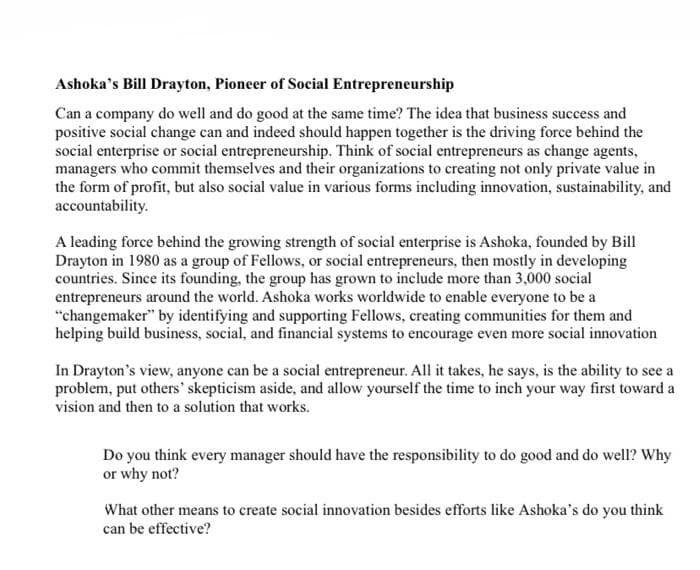Ashoka's Bill Drayton, Pioneer of Social Entrepreneurship Can a company do well and do good at the same time? The idea that business success and positive social change can and indeed should happen together is the driving force behind the social enterprise or social entrepreneurship. Think of social entrepreneurs as change agents, managers who commit themselves and their organizations to creating not only private value in the form of profit, but also social value in various forms including innovation, sustainability, and accountability. A leading force behind the growing strength of social enterprise is Ashoka, founded by Bill Drayton in 1980 as a group of Fellows, or social entrepreneurs, then mostly in developing countries. Since its founding, the group has grown to include more than 3,000 social entrepreneurs around the world. Ashoka works worldwide to enable everyone to be a "changemaker" by identifying and supporting Fellows, creating communities for them and helping build business, social, and financial systems to encourage even more social innovation In Drayton's view, anyone can be a social entrepreneur. All it takes, he says, is the ability to see a problem, put others' skepticism aside, and allow yourself the time to inch your way first toward a vision and then to a solution that works. Do you think every manager should have the responsibility to do good and do well? Why or why not? What other means to create social innovation besides efforts like Ashoka's do you think can be effective?
Ashoka's Bill Drayton, Pioneer of Social Entrepreneurship Can a company do well and do good at the same time? The idea that business success and positive social change can and indeed should happen together is the driving force behind the social enterprise or social entrepreneurship. Think of social entrepreneurs as change agents, managers who commit themselves and their organizations to creating not only private value in the form of profit, but also social value in various forms including innovation, sustainability, and accountability. A leading force behind the growing strength of social enterprise is Ashoka, founded by Bill Drayton in 1980 as a group of Fellows, or social entrepreneurs, then mostly in developing countries. Since its founding, the group has grown to include more than 3,000 social entrepreneurs around the world. Ashoka works worldwide to enable everyone to be a "changemaker" by identifying and supporting Fellows, creating communities for them and helping build business, social, and financial systems to encourage even more social innovation In Drayton's view, anyone can be a social entrepreneur. All it takes, he says, is the ability to see a problem, put others' skepticism aside, and allow yourself the time to inch your way first toward a vision and then to a solution that works. Do you think every manager should have the responsibility to do good and do well? Why or why not? What other means to create social innovation besides efforts like Ashoka's do you think can be effective?
Chapter1: An Overview Of Strategic Marketing
Section1.2: Toms: Purchase One And Give One
Problem 1C
Related questions
Question
8

Transcribed Image Text:Ashoka's Bill Drayton, Pioneer of Social Entrepreneurship
Can a company do well and do good at the same time? The idea that business success and
positive social change can and indeed should happen together is the driving force behind the
social enterprise or social entrepreneurship. Think of social entrepreneurs as change agents,
managers who commit themselves and their organizations to creating not only private value in
the form of profit, but also social value in various forms including innovation, sustainability, and
accountability.
A leading force behind the growing strength of social enterprise is Ashoka, founded by Bill
Drayton in 1980 as a group of Fellows, or social entrepreneurs, then mostly in developing
countries. Since its founding, the group has grown to include more than 3,000 social
entrepreneurs around the world. Ashoka works worldwide to enable everyone to be a
"changemaker" by identifying and supporting Fellows, creating communities for them and
helping build business, social, and financial systems to encourage even more social innovation
In Drayton's view, anyone can be a social entrepreneur. All it takes, he says, is the ability to see a
problem, put others' skepticism aside, and allow yourself the time to inch your way first toward a
vision and then to a solution that works.
Do you think every manager should have the responsibility to do good and do well? Why
or why not?
What other means to create social innovation besides efforts like Ashoka's do you think
can be effective?
Expert Solution
This question has been solved!
Explore an expertly crafted, step-by-step solution for a thorough understanding of key concepts.
Step by step
Solved in 3 steps

